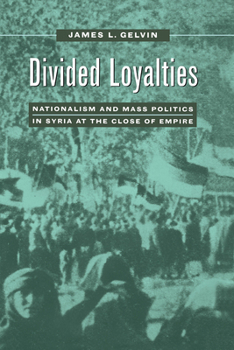Divided Loyalties: Nationalism & Mass Politics in Syria
Select Format
Select Condition 
Book Overview
James L. Gelvin brings a new and distinctive perspective to the perennially fascinating topic of nationalism in the Arab Middle East. Unlike previous historians who have focused on the activities and ideas of a small group of elites, Gelvin details the role played by non-elites in nationalist politics during the early part of the twentieth century. Drawing from previously untapped sources, he documents the appearance of a new form of political organization-the popular committee-that sprang up in cities and villages throughout greater Syria in the immediate aftermath of the First World War. These committees empowered a new type of nationalist leadership, made nationalist politics a mass phenomenon for the first time, and articulated a view of nation and nationalism that continues to inform the politics of the region today.
Gelvin does more than recount an episode in the history of nationalism in the Arab Middle East. His examination of leaflets, graffiti, speeches, rumors, and editorials offers fresh insights into the symbolic construction of national communities. His analysis of ceremonies-national celebrations, demonstrations, theater-contributes to our understanding of the emergence of mass politics. By situating his study within a broader historical context, Gelvin has written a book that will be of interest to all who wish to understand nationalism in the region and beyond.
Gelvin does more than recount an episode in the history of nationalism in the Arab Middle East. His examination of leaflets, graffiti, speeches, rumors, and editorials offers fresh insights into the symbolic construction of national communities. His analysis of ceremonies-national celebrations, demonstrations, theater-contributes to our understanding of the emergence of mass politics. By situating his study within a broader historical context, Gelvin has written a book that will be of interest to all who wish to understand nationalism in the region and beyond.
Format:Paperback
Language:English
ISBN:0520210700
ISBN13:9780520210707
Release Date:January 1999
Publisher:University of California Press
Length:353 Pages
Weight:1.10 lbs.
Dimensions:0.8" x 5.7" x 9.1"
Customer Reviews
1 rating
Intrepid and Creative Scholarship
Published by Thriftbooks.com User , 21 years ago
This work acts as a social history of the rise of nationalism in Syria during the short-lived Faisali gov't prior to the implentation the French and British Mandates following WWI and the King-Crane Commission. He aims at challenging two views prevalent (though quickly dying) of Arab nationalism: 1) that what occurred was an awakening of a perennial identity in remission rather than a construction of a national identity and 2) that intellectual histories of elites suffices to show the development of nationalism in the Middle East. Using an uncanny array of sources, novel approaches to investigation, and a particularly lucid picture of Syrian events of the time, he successfully demolishes both views.What emerges in its place is not only more cogent and probable but also bespeaks the multi-layered experience of nationalism and mass politics as it developed in Syria as he narrates the dialectic between the top-down efforts of the Faisali administration to secure a broad and stable influence over society and various, polyvalent efforts of local popular committees to appropriate national discourse into their own emerging interpretations. Gelvin's work should be read by any student of the modern Arab World.





